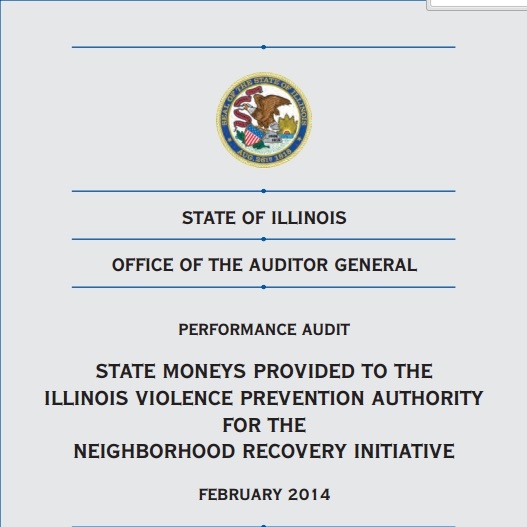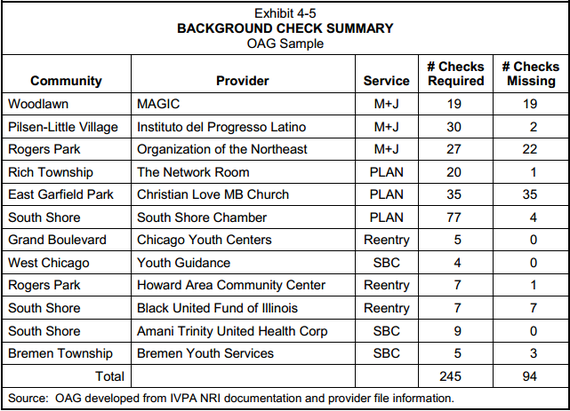The auditor general's office recently released its review of the Neighborhood Recovery Initiative, a program spearheaded by Governor Pat Quinn in 2010 when he was gearing up to run for re-election. The report, to be succinct, had some scathing comments to make about the program.
The NRI, which is overseen by the Illinois Violence Prevention Authority, was established to "focus on rebuilding Illinois' most vulnerable neighborhoods" and protect youth "by offering more job and education opportunities," according to the press release sent out by the governor's office when he announced the program. $50 million was allocated for the program.
Private agencies selected for the program received state funds to help offer job training, mentoring, counseling and other services to engage young people in violent communities. The initiative was supposed to help create as many as 1,700 jobs and improve the small business environment in the communities selected.
Lofty goals for an ambitious, well-meaning initiative. But the auditor general's report unfortunately found "pervasive deficiencies" in the Illinois Violence Prevention Authority's "planning, implementation, and management" of the Neighborhood Recovery Initiative.
Here are five of the most egregious things the auditor general's office found when examining 23 agencies participating in the initiative:
- In total, auditors questioned more than1.8 million in expenses reported by agencies selected to participate in the NRI program -- that's 40 percent of the4.4 million total charged by the agencies.
"[Auditors] found that in many instances the supporting documentation did not support the expenditure amount reported by the agency on their close-out report. In other instances, expenses were unallowable."
- Two of the agencies included in the auditor general's sample, the Southwest Youth Collaborative and the Metropolitan Area Group for Igniting Civilization (MAGIC), closed down while they were participating in the program. The Southwest Youth Collaborative closed in February 2013, and the Illinois Criminal Justice Information Authority was still trying to recover state funds in November 2013. MAGIC closed sometime during the first year of the program, and auditors found no documentation detailing what happened to the funds allocated to the agency -- and IVPA couldn't provide contact information for anyone associated with MAGIC, leaving673,674 basically unaccounted for.
- Agencies were required to conduct background checks on adults working with the program. The auditor general's office found that, of the sample agencies they looked at, 38 percent of the required checks were either not completed or recorded by the agencies. Some providers could not provide documentation for any of their background checks -- agencies in East Garfield Park, Woodlawn, and the South Shore were missing 100% of their background checks.
- For the background checks that were reviewed, the auditors found that some staff members hired by providing agencies had convictions on their records for a variety of offenses, including armed robbery, neglect of a child, burglary, and battery.
"We would note that these adults hired in the NRI program are to be acting in a mentoring role and working with youth."
- The program was meant to provide support for the most vulnerable and violent Cook County communities, but based on reports from the Chicago Police Department, six of the most violent communities in the city were inexplicably not selected for the NRI -- including West Englewood, the neighborhood with the fourth-highest rate of violence in the city. For some reason, in October 2013, Hermosa was added to the NRI, even though the neighborhood ranks 48th in violent crime. IVPA couldn't provide documentation that detailed how each community was selected for the program.
"An ICJIA official responded that Hermosa was not selected by ICJIA staff nor did ICJIA know who specifically selected Hermosa [for the program]."
Yikes. Quite a mess made with taxpayer money, no? Hopefully, the Illinois Criminal Justice Information Authority takes the auditor general's recommendations into account and cleans up their act.
***
Some state legislators told Governor Quinn that there were multiple problems with the NRI back in 2010. Find out what they warned him about in Rich Miller's column here.
You can view the entire report from the Office of the Auditor General on our site.
Want more from Reboot Illinois? Don't miss these articles:


